|
|
|
Sort Order |
|
|
|
Items / Page
|
|
|
|
|
|
|
| Srl | Item |
| 1 |
ID:
175707
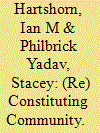

|
|
|
|
|
| Summary/Abstract |
As a speech act, takfir—the allegation of a Muslim’s apostasy—may insinuate violence in a way that can delimit the boundaries of political, as well as religious, community. Yet the use of takfir also incurs costs in plural political environments. Those who engage in it do not always see the dividends they may imagine. This article compares public acts of takfir at critical moments in Tunisia and Yemen to argue that the weight of this particular idiom is not universal, but is a function of the specific linguistic field in which it is employed as well as the historical juncture in which it takes place. Takfir both shapes and reflects the power relations between rival factions. As an informal discourse that occurs largely outside of formal state institutions, it nonetheless leaves a clear imprint on those institutions, particularly in moments of political transition when the contours of new constitutional arrangements are negotiated. Relying on ethnographic and interview-based field research from both Tunisia and Yemen, the context-specific arguments advanced here challenge the universalist prescriptions that underwrite policy efforts to engage in “counter-takfir” as a means of combatting excommunicative discourse.
|
|
|
|
|
|
|
|
|
|
|
|
|
|
|
|
| 2 |
ID:
091891
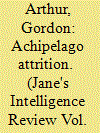

|
|
|
|
|
| Publication |
2009.
|
| Summary/Abstract |
The Islamist insurgent group, the Abu Sayyaf Group, has proven its ability to inflict significant losses on the Philippine military in recent attacks. Gorden Arthur examines the army's operations aimed at dismantling the rebel group and undermining its civilian support.
|
|
|
|
|
|
|
|
|
|
|
|
|
|
|
|
| 3 |
ID:
156914


|
|
|
|
|
| Summary/Abstract |
This article investigates Twitter data related to the kidnapping case of two German nationals in the southern region of the Philippines by the Abu Sayyaf Group (ASG). It explores perceptions of the ASG, along with associated organizations and sentiments indicated in the tweets together with statistically significant relationships. Findings revealed that: “Rebel” and “Militant” were the most frequently used labels for the ASG; a majority of the tweets contained sentiments that assess threats such as abduction and kidnapping of hostages; and almost half contained words that indicate negotiation or concession to the demands of the captors. Logistic regression analyses on “Rebel” and “Islamist” revealed positive coefficients for these sentiments used as predictors. This meant that people who assessed threats and expressed sentiments that responders should concede to the captors’ demands were more likely to use the “Rebel” or “Islamist” labels. Rather than the two longstanding dominant narratives of the ASG as terrorists and criminals, the emerging rebel and militant labels suggest a more domestically and politically sensitive Twitter commentary than is represented in the work of the Al-Qaeda-centric paradigm exponents. These findings, along with the complex associated political and policy contexts and implications, are discussed in this article.
|
|
|
|
|
|
|
|
|
|
|
|
|
|
|
|
| 4 |
ID:
097323
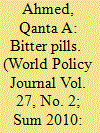

|
|
|
| 5 |
ID:
103867
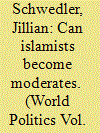

|
|
|
|
|
| Publication |
2011.
|
| Summary/Abstract |
Recent years have seen a surge of studies that examine the inclusion-moderation hypothesis with reference to political Islam: the idea that political groups and individuals may become more moderate as a result of their inclusion in pluralist political processes. Most of these interventions adopt one of three foci: (1) the behavioral moderation of groups; (2) the ideological moderation of groups; and (3) the ideological moderation of individuals. After a discussion of various definitions of moderate and radical, the concept of moderation, and the centrality of moderation to studies of democratization, the author examines the scholarship on political Islam that falls within each approach. She then examines several studies that raise questions about sequencing: how mechanisms linking inclusion and moderation are posited and how other approaches might better explain Islamist moderation. Finally, she offers a critical analysis of the behavior-ideology binary that animates many of these models and suggests some fruitful paths for future research.
|
|
|
|
|
|
|
|
|
|
|
|
|
|
|
|
| 6 |
ID:
103558
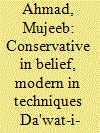

|
|
|
| 7 |
ID:
116892


|
|
|
|
|
| Publication |
2012.
|
| Summary/Abstract |
It has become common to regard consociational democracy as a method of managing conflict in ethnically divided societies but little attention has been paid to its applicability to societies where the primary political cleavage is between secular and religious forces. This article seeks to redress this imbalance by examining the applicability of consociationalism to the case of the Palestinian Territory. We argue that, while Palestinian society is characterised by 'pillarisation' along a secularist/Islamist cleavage, formal power-sharing between the representatives of the two main Palestinian factions, namely Fatah and Hamas, has proved elusive. However, rather than seeking to explain the seeming inability of the factions to share power by reference to the nature of the cleavage, as other authors have done, we instead highlight the contextual factors that have made power sharing difficult to achieve, namely the difficulties Hamas and Fatah face in accepting each other as political partners, and opposition from external actors.
|
|
|
|
|
|
|
|
|
|
|
|
|
|
|
|
| 8 |
ID:
091170
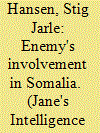

|
|
|
|
|
| Publication |
2009.
|
| Summary/Abstract |
Supporting allies in a conflict in foreign lands is an adventure fraught with difficulty. As imperial powers regularly discovered, local powerbrokers can often incite violent opposition that undermines any influence they have. Moreover, the ability to control proxies, who often come saddled with their own personal amitions and enemies, is limited, meaning even if they are successful in brokering power, they may pursue policies antithetical to the patron state. The fact that the anti-Soviet mujahideen in Afghanistan were materially supported by the United States in the 1980s, and went on to forge both Al-Qaeda and the Taliban, is a current example of the dangers of proxy support.
|
|
|
|
|
|
|
|
|
|
|
|
|
|
|
|
| 9 |
ID:
124274
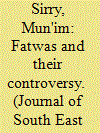

|
|
|
|
|
| Publication |
2013.
|
| Summary/Abstract |
This article discusses a different side of two controversial fatwas - one against Muslims participating in Christmas celebrations and the other against pluralism, liberalism and secularism - issued by the Majelis Ulama Indonesia (MUI, Council of Indonesian Ulama). Most studies on MUI have emphasised the role that the Council's fatwas have played in inciting sectarian violence in Indonesia. Without denying the connections between violence and the MUI fatwas, this article argues that these controversial fatwas have also opened up room for more fruitful and constructive discussions among different religious groups in Indonesia. This article asks: What were the roots of the controversy over these intolerant fatwas? How did the state respond to them? And what does the controversy over these fatwas tell us about the nature of public debate on Islam in Indonesia? By answering these questions this article will shed light on aspects of contemporary Indonesian public debates about Islam that have been overlooked in current scholarship
|
|
|
|
|
|
|
|
|
|
|
|
|
|
|
|
| 10 |
ID:
125124
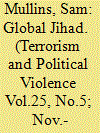

|
|
|
|
|
| Publication |
2013.
|
| Summary/Abstract |
This study aims to address the relative lack of research examining the Canadian experience of terrorism relating to the "Global Salafi Jihad." The fundamental research question was "What have people living in, or from, Canada been doing to support or advance violent jihad either at home or abroad?" Data were collected on individuals active from the 1980s through to the end of 2011 in an effort to be as exhaustive as possible. They were analysed according to three broad categories: background variables; operational variables; and investigations and outcomes. The sample was further divided into two and results compared according to whether individuals began offending before or after September 11, 2001, in order to assess change over time. The article begins with a brief history of terrorism in Canada, followed by the methodology, analysis of variables, and summary and conclusions. Cases included and excluded from the analysis are listed in Appendices A and B respectively.
|
|
|
|
|
|
|
|
|
|
|
|
|
|
|
|
| 11 |
ID:
179305
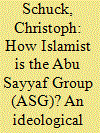

|
|
|
|
|
| Summary/Abstract |
This article demonstrates that militant groups who base their actions on Islam do so for two reasons: Either they do in fact pursue Islamist objectives, or the groups use what appears to be an Islamist narrative in order to pursue goals which actually have no religious basis. In the first part, conceptual issues are discussed to differentiate these motivations and examining how they are implemented beyond rhetoric. In the second part, the conceptual findings are applied to the Philippine Abu Sayyaf (ASG), since there is no agreement in academic debate on the group’s classification. It is demonstrated that the ASG had intrinsically Islamist features that continuously changed into a more instrumentalizing Islamist behavior. Despite the high fragmentation of the group today, it is argued that the ASG is a largely non-Islamist group which knows how to use an Islamist narrative to portray itself in ways that give it an advantage.
|
|
|
|
|
|
|
|
|
|
|
|
|
|
|
|
| 12 |
ID:
173838
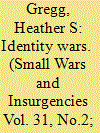

|
|
|
|
|
| Summary/Abstract |
Collective identity building is a critical component of most insurgent movements, including constructing a compelling cause with which individuals can identify and a sense of purpose and camaraderie. Counterinsurgencies, by contrast, devote surprisingly little attention to creating identities that compete with insurgents. Instead, they tend to focus on providing goods and services to vulnerable populations with the assumption that emotional resources, such as a sense of identity and purpose, are not necessary. This article draws from theoretical work on identity building to outline how collective identities are constructed, what they include, and how they shape human behavior. It then considers the U.S. led operations in Iraq from 2003–2011, and compares these efforts to the emergence of Sunni Islamist insurgencies in Iraq to investigate how insurgents used identity building, but counterinsurgents did not. It then applies this theoretical literature to construct a program for how counterinsurgents could include identity construction as part of its strategy to undermine insurgent movements.
|
|
|
|
|
|
|
|
|
|
|
|
|
|
|
|
| 13 |
ID:
089859
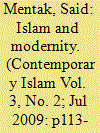

|
|
|
| 14 |
ID:
101649
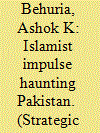

|
|
|
| 15 |
ID:
103799
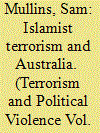

|
|
|
|
|
| Publication |
2011.
|
| Summary/Abstract |
Australian interests have been considered viable targets for Islamist terrorists since at least 2001, and Australians have suffered from attacks in Bali in 2002 and 2005, and Jakarta in 2004 and 2009. Moreover, Australian citizens have been involved in militant Islamist networks since the late 1980s, and similar to other Western countries in recent years there have been examples of "home-grown" plots to carry out domestic terrorist attacks. This article seeks to clarify the nature of the contemporary security threat within Australia by analysing the involvement of Australian citizens and residents in Islamist terrorism, both at home and abroad. The results build upon previous research findings revealing that while the profile of Australian jihadis is unique in terms of its exact manifestation, there is overall conformity with generally observed trends in Islamist terrorism in other Western countries.
|
|
|
|
|
|
|
|
|
|
|
|
|
|
|
|
| 16 |
ID:
132289
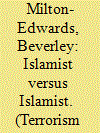

|
|
|
|
|
| Publication |
2014.
|
| Summary/Abstract |
Islam's diversity is a direct result of centuries of schism and factionalism, and presents a challenge to the original spirit of unity as envisaged by its founder, the Prophet Mohammed. Rivalry within Islam undermines the precedent notion of unity through communal belonging (tawhid and ummah). Yet in the twenty-first century this diversity is ignored, and political Islam is represented as being more of a monolith than a spectrum of ideas and aspirations. Generally, the materialization of new Islamist groups is a challenge to those who hold that unity is all. In the Gaza Strip, specifically, the dominant Islamist actor, Hamas, is facing internal challenges from other Islamist elements. These rival Islamists are also influenced by events across their border in post-revolutionary Egypt where a plethora of new Islamist actors are vying for political space and power. This article deals with Hamas's Islamist rivals, and the effects they have had on Hamas's governance of the Gaza Strip, and political and religious legitimacy within it. It will focus on ideological and violent disputes between the Islamist elements in Gaza, and the means by which Hamas and its security elements have tackled newly emerging rivals.
|
|
|
|
|
|
|
|
|
|
|
|
|
|
|
|
| 17 |
ID:
161445


|
|
|
|
|
| Summary/Abstract |
The results of Malaysia’s 14th General Elections held in May this year were unexpected and transformative. Against conventional wisdom, the newly-reconfigured opposition grouping Pakatan Harapan decisively defeated the incumbent Barisan Nasional. Despite a long-running financial scandal dogging the incumbents, an opposition victory had been all but discarded due to the advantages of incumbency, a deep fissure amongst opposition ranks, and a favourable economic outlook. Notwithstanding this, deeply-rooted political dynamics and influential actors came together, reconfiguring the country’s political landscape in the process. In order to understand the elections and their implications, this article sets out the country’s institutional context and then identifies key drivers and agents of change. From there, it assesses the conduct of the elections, analyses their results, and explores implications for the future.
|
|
|
|
|
|
|
|
|
|
|
|
|
|
|
|
| 18 |
ID:
108464
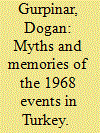

|
|
|
| 19 |
ID:
099484
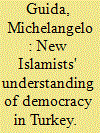

|
|
|
|
|
| Publication |
2010.
|
| Summary/Abstract |
Even though reaching a conclusive point seems impossible, debate on the relation between Islam and democracy is one of the most foundational discussions in politics today. Turkey is frequently seen as a positive example demonstrating the compatibility between Islam and democracy. Especially after the democratic reforms undertaken by the Islamist Prime Minister Recep Tayy?p Erdogbrevean and his effective governance. Erdogbrevean's party, the Justice and Development Party, seems to represent the Turkish Islamist intellectuals' political response to international and internal pressure toward democracy. Although it is true that the majority of contemporary Turkish Islamists have accepted liberal democracy, their devotion to its values has only been in form of a very pragmatic and functional approach rather than a true commitment to democracy.
This paper will briefly focus on the international and internal pressures on conservative intellectuals toward democracy. More extensively, Ali Bulaccedil and Hayreddin Karaman, two living Islamist authors, their intellectual careers, interpretations of democracy and their problematic approach to democracy will be thoroughly discussed. The two authors defend democracy and civil rights. However, democracy is only taken as a set of representative institutions and a free electoral system, and not pluralism, civility and tolerance. Yet at the same time, it is this contradiction that has been one of the major obstacles to the development of a true democracy in Turkey.
|
|
|
|
|
|
|
|
|
|
|
|
|
|
|
|
| 20 |
ID:
105628
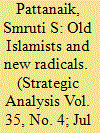

|
|
|
|
|
| Publication |
2011.
|
| Summary/Abstract |
The new radicals in Pakistan have challenged the old Islamists as represented by the religious political parties on the nature of state and the means to capture state power. These new radicals reject the 'bottom up' approach followed by the traditional Islamic political parties and prefer a 'top down' approach. Their ideological inspiration and reference point is Afghanistan under Taliban. This paper explores the relationship between the state and Islamists historically and examines how the state initiated Islamisation, in the process giving birth to new radicals that cashed in on the state's failure and posed an ideological challenge to the Pakistani state.
|
|
|
|
|
|
|
|
|
|
|
|
|
|
|
|
|
|
|
|
|